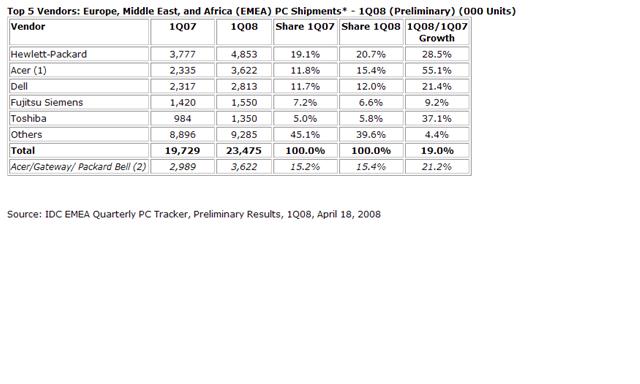E-waste Issue
Description
According to new preliminary data released by IDC EMEA in 1Q2008, PC shipments in EMEA recorded robust 19% growth compared with the same quarter in the previous year. Another report by IDC implied that PC shipments in Asia/Pacific (excluding Japan) in the fourth quarter of 2007 was around 18.1 million, which grew more than 20% from the same quarter one year ago.

China is the world's largest TV market, with 378million TV households by the end of 2007.Intex Management Services Ltd, a marker research company forecasted that the number of European homes receiving digital TV would grow to 108 million in 2009. Nielson’s study on United States showed that the total number of television households within the US (including Alaska and Hawaii) would be 112.8 million by January 1, 2008.
A report in 2006 implied that over 90 percent of South Korean, Japanese and urban Chinese households own at least one mobile phone, while in Western Europe, 80 percent of all households owned a mobile phone. About 75 percent of U.S. households own a mobile phone. The number of users would probably experience an increasing trend. According to the Ministry of Industry and Information, the mobile phone subscribers in China has risen to more than 574 million by March 2008.
From these data, we can see that the use of these electronic equipments will experience continuously increase in the future years. Along with the robust growth, how to deal with the electronic waste issue have raised concern by the whole sociaty.
Enablers
- Matured Electronic waste processing systems;
- Basel Convention on the Control of Transboundary Movements of Hazardous Wastes and Their Disposal;
- Increasing number of electronic waste processing Center has been built in China while China's newly released Administrative Measures for the Prevention and Control of Environmental Pollution by Electronic Waste has been enacted from February 1, 2008. As China is the largest consumer electronics market, and 70% Of World's Electronic Waste would be Discarded In China,
the rugulations and processing centers would probably help improving its capacity on cycling e-waste, and reduce the negative influence on environment.
Inhabitors
- Instead of recycling used electronics, large amounts of used electronics have been illegally sent to developing countries;
- Lack of awareness on the hazard of e-waste in some poverty-stricken areas, and also governors in these areas have not enacted sound law and regulations;
Paradigms
Before people understand the harm of e-waste, most of the electronic equipments at end-of-life were disposed as common garbage or resold to poor countries. However, in the 1990s some European countries banned the disposal of electronic waste in landfills. This created an e-waste processing industry in Europe. In Switzerland,all electronic waste should return to the sales points and other collection points free of charge. Today the e-waste recycling business is in all areas of the developed world a big and rapidly consolidating business. Though comparing with these developed countries, the developing countries still lack of enforcement of legislation, the condition is gradually getting better, for example, China has built some e-waste processing center and enacted Administrative Measures to deal with w-waste issue. At the same time, more and more companies offer free recycling for old electronics equipment(such as Sony).
Timing
- 1990s, many European countries banned e-waste from landfills;
- 1991, in Switzerland the first electronic waste recycling system was implemented beginning with collection of old refrigerators; Legislation followed in 1998 and since January 2005 it has been possible to return all electronic waste to the sales points and other collection points free of charge.
- Basel Convention was opened for signature on March 22, 1989, and entered into force on May 5, 1992, it is an international treaty that was designed to reduce the movements of hazardous waste between nations, and specifically to prevent transfer of hazardous waste from developed to less developed countries (LDCs);
- February 2003, Waste Electrical and Electronic Equipment Directive (WEEE Directive) became European Law;
Web Resources
Go Back to The future of television 2015